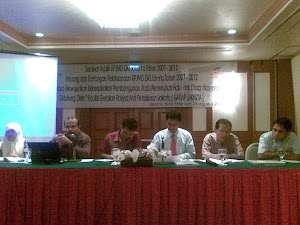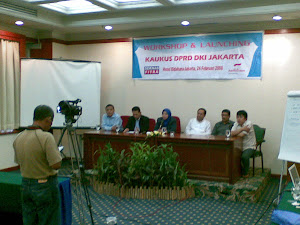 Picture : Live Talkshow on JakTV (26/11/2008) to discuss about CRC survey results
Picture : Live Talkshow on JakTV (26/11/2008) to discuss about CRC survey results
People living in poverty in Jakarta say the city administration's health and education services are good, a survey conducted by several NGOs reveals.
The survey, carried out on 400 low-income bracket residents by the Partnership for Governance Reform, the Coalition of Jakarta Non-Poverty Movement and the Center of Regional Research and Information, shows that 90.25 percent of the surveyed responded positively about the two sectors.
The respondents were low-income bracket residents in possession of relief letters (SKTM) and poor person cards (GAKIN) of 42 districts in five municipalities throughout the city. They were asked to rate the quality of public health centers and hospitals and elementary and junior high schools, specifically the quality of facilities, administration services, the performances of teachers and health officers, and to list complaints.
The survey found that 93.2 percent of the respondents said public health centers did not have cumbersome bureaucracy, while 65.2 percent praised hospitals' administration services. Some 92.2 and 91.5 percent of respondents praised public health centers' offices and facilities, respectively, while 78.3 and 90.6 percent praised those of hospitals.
The results surprised NGOs, experts and the surveyors. "We were very surprised when we first found out about the results, but these are the facts," said Agung Wasono of the Partnership for Governance Reform.
"But, no matter what the results, the administration should improve its services in the health and education sectors. "Although 'only' 30 percent of respondents were dissatisfied with the hospital's administration services, for instance, the number still matters," he said.
Abdul Malik, an education expert, said the survey was not conclusive. "It did not touch on substantial aspects of education and health services, like have pregnant women received quality services? It should have revealed more specific information," Abdul said. "The results are still pretty rough. I don't even think it will be useful for the administration in (its efforts to) improve education and health quality. "You should go deeper so that you can help the administration solve its problems in the two sectors," he said.
Coordinator of the Jakarta Residents Forums, Azas Tigor Nainggolan, concurred. "If (the case) were a computer, the survey would have covered only the hardware, not the software," Tigor said. Many residents have found it difficult to apply for SKTM letters and Gakin IDs.
In 2005, the administration distributed Gakin cards to residents eligible for low-cost or free health care and food. Low-income bracket residents can also apply for SKTM letters, which would make them eligible for discounted or free medical care. SKTM holders pay only 50 percent of medical fees, while Gakin holders pay nothing. SKTM applicants must submit notification letters from their neighborhood's unit chief and from subdistrict officials as well as a letter from their local community health care center underwriting their financial status.
The survey showed respondents felt high school facilities and teachers were superior to those at elementary schools.
Triwik Kurniasari , The Jakarta Post , Jakarta Wed, 11/26/2008 10:43 AM Headlines
Sumber : The Jakarta Post
Related News : Republika Online, Kompas Cetak, Berita Jakarta, Suara Merdeka
The survey, carried out on 400 low-income bracket residents by the Partnership for Governance Reform, the Coalition of Jakarta Non-Poverty Movement and the Center of Regional Research and Information, shows that 90.25 percent of the surveyed responded positively about the two sectors.
The respondents were low-income bracket residents in possession of relief letters (SKTM) and poor person cards (GAKIN) of 42 districts in five municipalities throughout the city. They were asked to rate the quality of public health centers and hospitals and elementary and junior high schools, specifically the quality of facilities, administration services, the performances of teachers and health officers, and to list complaints.
The survey found that 93.2 percent of the respondents said public health centers did not have cumbersome bureaucracy, while 65.2 percent praised hospitals' administration services. Some 92.2 and 91.5 percent of respondents praised public health centers' offices and facilities, respectively, while 78.3 and 90.6 percent praised those of hospitals.
The results surprised NGOs, experts and the surveyors. "We were very surprised when we first found out about the results, but these are the facts," said Agung Wasono of the Partnership for Governance Reform.
"But, no matter what the results, the administration should improve its services in the health and education sectors. "Although 'only' 30 percent of respondents were dissatisfied with the hospital's administration services, for instance, the number still matters," he said.
Abdul Malik, an education expert, said the survey was not conclusive. "It did not touch on substantial aspects of education and health services, like have pregnant women received quality services? It should have revealed more specific information," Abdul said. "The results are still pretty rough. I don't even think it will be useful for the administration in (its efforts to) improve education and health quality. "You should go deeper so that you can help the administration solve its problems in the two sectors," he said.
Coordinator of the Jakarta Residents Forums, Azas Tigor Nainggolan, concurred. "If (the case) were a computer, the survey would have covered only the hardware, not the software," Tigor said. Many residents have found it difficult to apply for SKTM letters and Gakin IDs.
In 2005, the administration distributed Gakin cards to residents eligible for low-cost or free health care and food. Low-income bracket residents can also apply for SKTM letters, which would make them eligible for discounted or free medical care. SKTM holders pay only 50 percent of medical fees, while Gakin holders pay nothing. SKTM applicants must submit notification letters from their neighborhood's unit chief and from subdistrict officials as well as a letter from their local community health care center underwriting their financial status.
The survey showed respondents felt high school facilities and teachers were superior to those at elementary schools.
Triwik Kurniasari , The Jakarta Post , Jakarta Wed, 11/26/2008 10:43 AM Headlines
Sumber : The Jakarta Post
Related News : Republika Online, Kompas Cetak, Berita Jakarta, Suara Merdeka


.jpg)
.jpg)
.jpg)
.jpg)


.jpg)

Tidak ada komentar:
Posting Komentar